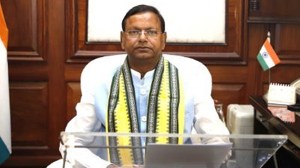Red capitalism
As India debates its new budget this week, China, too, is gearing up for an annual review of the government8217;s economic work in 2006 and to set goals for the new year.

As India debates its new budget this week, China, too, is gearing up for an annual review of the government8217;s economic work in 2006 and to set goals for the new year.
The usually dull discussion at the National People8217;s Congress, the Chinese National Parliament, which convenes on March 5, could turn out to be politically controversial this year.
The NPC is expected to discuss a draft legislation on the rights to private property in Communist China. For nearly five years now, the Chinese Communist Party has been attempting to get the NPC to approve a law to strengthen laws on private property. In March 2004, the Chinese Constitution approved the principle of the right to private property. But opposition from party ideologues has stalled the move to put in place a legal framework for protecting that right.
Since it reversed the national economic direction in the late 1970s, the CCP has found it increasingly difficult to manage one of the core contradictions of the reforms 8212; between the notion of inviolable state ownership of property under communism and the limited rights of individual ownership that were granted over the last two decades. This contradiction, in turn, has fed into the growing rural unrest, mounting corruption and arbitrariness of government officials acting in the name of the state8217;s property rights.
Many Singurs
The draft legislation, according to media leaks, says in a key formulation that 8220;ownership rights of the state, groups and individuals are protected by law, and no individual or organisation may violate these rights.8221; This would, Chinese leaders hope, lend the same legal basis to private property as that held by the state and also end the abuse of power by officials to arbitrarily seize and expropriate the property of citizens.
When Chairman Deng Xiaoping liberated the countryside from the rigours of communist orthodoxy, the rural communes were broken up and peasant families got rights for private land use 8212; up to a period of 30 years.
In theory, the peasants have the right to initiate legal action to protect their leases. But in practice, the officials of the 8220;party-state8221; at the local level have had the power to reacquire land.
As the pressure on rural lands mounted in recent years, the abuse by local authorities to confiscate peasant lands and hand them over to real estate developers, and in the process line their own pockets, has become the norm. The peasants have reacted violently against illegal eviction, land confiscation and inadequate compensation.
Land disputes apparently accounted for nearly 50 per cent of the rural unrest in China and threatened to undermine President Hu Jintao8217;s campaign for a 8220;harmonious society8221; in China.
The new law, while maintaining that all land is owned by the state, gives peasants the freedom to sell their land use rights for cash and creates a registration system of land use transfers above the county level, which has been the source of much of the corruption and arbitrariness.
Privatisation blues
As the NPC prepares to debate property rights, a number of left wing intellectuals and retired officials have attacked the draft legislation in a petition that has been widely publicised on the internet.
The government has retaliated by blocking the internet sites promoting the petition. Similar protests last year had prevented the government from pressing for an adoption of the law on private property.
The unease against privatisation does not only come from left extremists of the CCP. Many reformers are concerned that giving absolute land rights to peasants will make the necessary transition to modern large scale farming difficult by freezing the current fragmented land holding patterns.
The reformers also insist that the answer to rural unrest lies in encouraging urbanisation and converting peasants into workers, rather than sanctifying the land ownership of peasants.
- 01
- 02
- 03
- 04
- 05































